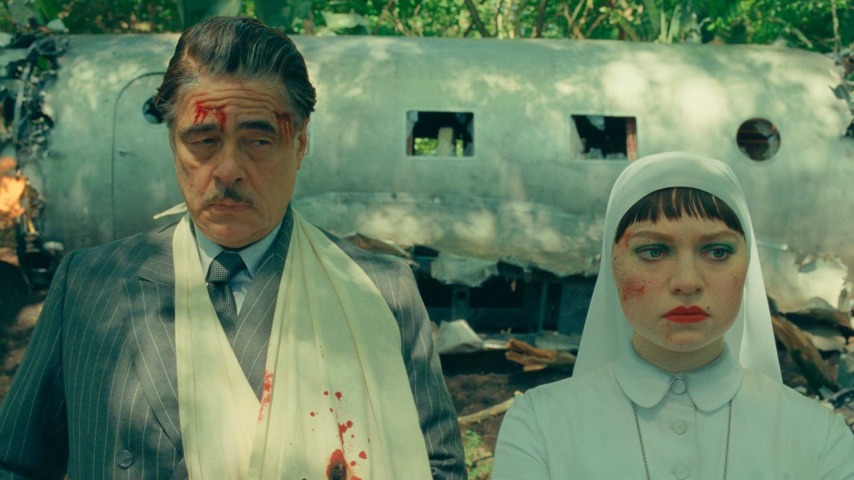The year is 1950. Anatole Zsa-Zsa Korda, mystery man of uncertain national origin and master of the backroom deal, has just survived his umpteenth assassination attempt. Taking control of his damaged private plane, he dismisses the pilot with a press of the ejector-seat button and readies for a rough landing. This is not his first plane crash, or even his second, though it looks for the moment like it might be his last. By the time Korda regains consciousness in a wreckage-strewn field, the wire services have already started rushing out their premature obituaries, detailing an unflattering legacy. Korda, however, has had a vision (the first of many): He has visited Heaven.
The experience does not appear to have much of an effect on Korda’s morals (or apparent lack thereof). But it does, for reasons he refuses to elaborate, inspire him to write a new will that will leave his entire empire to his only daughter, Leisl, who was sent away to a convent at age five to keep her “away from boys” and has, to Korda’s bemusement, become a nun.
So begins The Phoenician Scheme, a piece of mid-century whimsy that mostly floats by on the unmistakable Wes Anderson style. As played by a dapper-but-sullen-looking Benicio del Toro, Korda belongs to the classic Anderson tradition of unflappable, quixotic eccentrics and bad dads, as well as the smaller, but still distinct, category of Anderson characters that seem to possess an air of unsolved mystery. Beset by spies and assassins, he tests all of his drinks for poison before taking a sip and travels everywhere with a fruit box of live grenades.
Leisl (Mia Threapleton) is understandably reluctant to sign off on the paperwork he’s presented to her, first because she has taken certain vows that contradict the Korda family business and lifestyle, and second because her mother was one of several Mrs. Kordas to have perished under mysterious circumstances, with dad as the most likely suspect (though he swears he didn’t do it).
But there are pressing matters and intrigues to contend with. While Korda has been recuperating, his enemies have moved to manipulate the global market on rivets, wiping out his assets and threatening his most ambitious venture, a grandiose infrastructure project in the politically unstable Middle Eastern territory of Greater Independent Phoenicia. Accompanied by Leisl and his Norwegian tutor-turned-acting-secretary Bjorn (Michael Cera, doing a very goofy accent), he sets off to Phoenicia to negotiate new deals with his various shady partners and keep the whole thing from falling apart. There’s a local prince (Riz Ahmed), a fez-wearing French nightclub owner (Mathieu Amalric), assorted representatives of American interests (Bryan Cranston, Tom Hanks, Jeffrey Wright), and a cousin (Scarlett Johansson) that Korda might be trying to marry, not to mention Korda’s own despicable half-brother, Nubar (Benedict Cumberbatch in a fake beard of Biblical proportions).
Compared to the baroque ambitions of recent Anderson films like The French Dispatch and Asteroid City, the script of The Phoenician Scheme is relatively straightforward: no theatrical distancing effects, no stories-within-stories, no nesting-doll structure, no voiceover. Traveling through Phoenicia, Korda, Leisl, and Bjorn make their way through their itinerary of characters, periodically encountering would-be assassins and communist revolutionaries. The structure is episodic, somewhat elliptical, and occasionally clumsy. Even the widely imitated and parodied Anderson style, with its symmetries and whip pans, wavers toward the end, leading to an incoherent climax. (The fact that this is the first live-action feature Anderson has made without his longtime cinematographer, Robert Yeoman, is only a partial explanation.)
Which is to say that The Phoenician Scheme lacks the richer, more interesting dimensions and poignant signatures of Anderson’s better films. While Korda has a lot in common with the great characters that have populated the dollhouse auteur’s oeuvre, he has neither the humanizing flaws of a Royal Tenenbaum or a Steve Zissou, nor the charismatic and melancholy qualities of a Gustave H. The only glimpses we get inside his head come through recurring black-and-white dream sequences depicting the afterlife, which are mostly an excuse for various Anderson company players to pop up in bit roles. (We’ll give you one guess as to which one of them plays God.)
At times, The Phoenician Scheme veers precariously close to becoming the kind of visually fussy vintage quirkfest that Anderson is sometimes accused of making, but never actually does. What rescues it, periodically, is Anderson’s formidable comedic sensibility. Part of the problem with the countless Anderson spoofs that have been made over the years is that none of them are actually as funny as the real thing; few working directors, if any, have his mastery for timing and framing a punchline, visual gag, or abrupt change in tone (which, in this case, includes some surprisingly gory violence). In The Phoenician Scheme, he manages to get a good laugh even if the gags themselves are second-rate.
Director: Wes Anderson
Writer: Wes Anderson
Starring: Benicio del Toro, Mia Threapleton, Michael Cera, Riz Ahmed, Tom Hanks, Bryan Cranston, Mathieu Amalric, Richard Ayoade, Jeffrey Wright, Scarlett Johansson, Benedict Cumberbatch, Rupert Friend, Hope Davis
Release Date: May 30, 2025

 Keep scrolling for more great stories.
Keep scrolling for more great stories.
